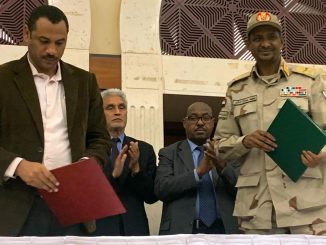
Egypt said on Sunday it would host a summit of Sudan’s neighbors on July 13 to discuss ways to end a 12-week conflict between rival Sudanese military factions that has triggered a major humanitarian crisis in the region, reported Reuters.
Diplomatic efforts to halt fighting between Sudan’s army and the Rapid Support Forces (RSF) have so far proved ineffective, with competing initiatives creating confusion over how the warring parties might be brought to negotiate.
Neither Egypt, seen as the Sudanese army’s most important foreign ally, nor the United Arab Emirates, which has had close ties to the RSF, have played a prominent public role.
The two countries were also not involved in talks in Jeddah led by the United States and Saudi Arabia that adjourned last month after failing to secure a lasting ceasefire.
Sudan’s two largest neighbours, Egypt and Ethiopia, have been at odds in recent years over the construction of a huge hydroelectric dam on Ethiopia’s Blue Nile, close to the border with Sudan.
The summit in Cairo on Thursday aims to “develop effective mechanisms” with neighbouring states to settle the conflict peacefully, in coordination with other regional or international efforts, Egypt’s presidency said in a statement.
Meanwhile, Sudanese delegations, including from civilian parties that shared power with the army and RSF after the overthrow of former president Omar al-Bashir four years ago, are expected to meet on Monday in the Ethiopian capital Addis Ababa for exploratory talks.
The leaders of former rebel groups from Darfur that signed a partial peace deal in 2020 are expected to travel to Chad for talks, though the timing of the talks is unclear and travel in and out of Sudan remains complicated due to the conflict.
The fighting that erupted on April 15 in Sudan’s capital Khartoum has driven more than 2.9 million people from their homes, including almost 700,000 who have fled to neighbouring countries, many of which are struggling with poverty and the impact of internal conflict.
Over 255,000 have crossed into Egypt, according to latest figures from the International Organization for Migration.
There were clashes on Sunday between the army and the RSF in El Obeid, southwest of Khartoum, as well as in the south of the capital, residents said.
On Saturday, Sudan’s health ministry said a strike by fighter jets in Omdurman, part of Sudan’s wider capital, left 22 people dead, an incident that drew condemnation from U.N. Secretary General Antonio Guterres.
On Sunday, the army denied responsibility for the strike, saying its air force had not hit targets in Omdurman the previous day and that the RSF had bombarded residential areas from the ground at times when fighter jets were in the sky before falsely accusing the army of causing civilian casualties.
The army has depended largely on air strikes and heavy artillery to try to push back RSF troops spread across Khartoum, Omdurman and Bahri, the three cities that make up the capital around the confluence of the Nile.
Violence has also flared in other parts of Sudan including the western region of Darfur, where residents say militias from Arab tribes along with the RSF have targeted civilians on the basis of their ethnicity, raising fears of a repeat of the mass atrocities seen in the region after 2003.



